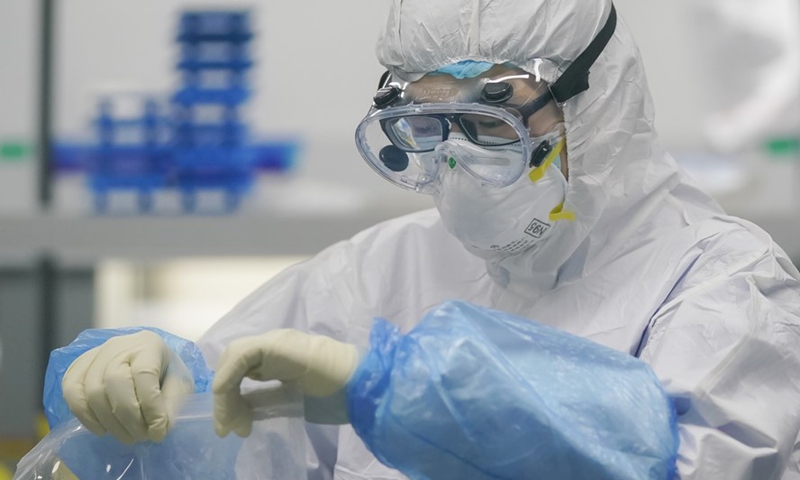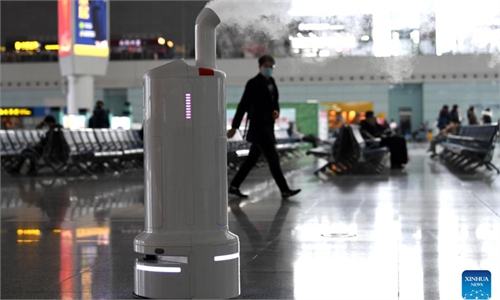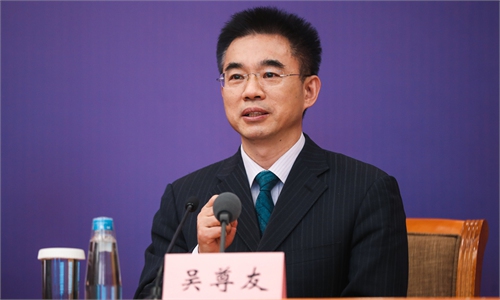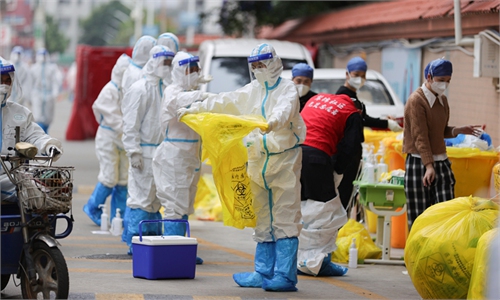Political advisor calls for salary system improvement to attract, retain talents working for disease control and prevention

A staff member handles nucleic acid testing samples at a novel coronavirus detection lab in Wuhan, central China's Hubei Province, February 22, 2020. Photo:Xinhua
Professor Wu Fan, member of the 13th National Committee of the Chinese People's Political Consultative Conference and Associate Dean of the Shanghai Medical College of Fudan University, called for the improvement of the salary system for employees of the country's disease control and prevention system to strengthen staff by attracting and retaining more talents.
The proposal was made at the ongoing two sessions in Beijing. It also came as staff of Shanghai's disease control and prevention system demonstrated once again their efficiency in reacting to the outbreak, as Wu Jinglei, Director of Shanghai's Health Commission, highlighted at a press conference on March 4, remarking that the city dispatched a team of 3,000 from the local disease control and prevention centers to conduct epidemiological investigation of more than 500,000 residents in a few days during a latest outbreak.
Two years' efforts to prevent and control COVID-19 outbreaks in China have given the public a deep understanding of the importance of a strong and professional disease control team. Local governments have also paid high attention to the construction of local disease control and prevention centers and made efforts to expand the team. Wu, who is also a member of Shanghai's COVID-19 prevention and control expert team and was in the municipality's frontline against the novel coronavirus for more than two years, said in a proposal she shared with the Global Times.
However, a major problem for local governments is that high standards, low salaries, heavy burdens and poor prospects of professional development have led to an embarrassing situation where it is hard to attract and retain talents for the team, according to the proposal.
Citing data from the national health authority, Wu and her colleagues pointed out in an article in May 2020, that from 2009 to 2018, the number of medical employees in the country increased by about 58 percent, from 7.8 million to 12.3 million. But those in the disease control and prevention system decreased by about 10 percent, from 197,000 to 188,000, during the same period.
According to Wu's proposal on this year's two sessions, the Chinese CDC system has very high standards for employees. Most staff are graduates from medical specialty or related fields. Some national and provincial-level institutes even require a master's degree. However, after joining the system, they usually receive a lower salary than local public servants and those in other medical institutions at the same level although they often work overtime. Sometimes, a team on an 8-hour shift has to work for 16 or even 24 hours, according to Wu.
For example, Wu introduced that, to ensure a quick reaction, the Shanghai disease control and prevention system has set up a 2+4+24 working mechanism. It means that, after an infection case is reported, the system would send epidemiological investigation personnel to collect samples in two hours; finish main epidemiological investigation and implement managing measures in four hours; and track all related people and their travel history; and disinfect all related places in 24 hours.
There is also a lack of a mechanism to encourage scientific research in the system, which is not conducive to the long-term development of disease control professionals in China as CDCs have to conduct a great number of basic research to improve their abilities in supervision and early warning, risk evaluation and rapid emergency reaction, among others, Wu pointed out.
Wu suggested raising the salary for CDC employees to match the average of those at local medical institutions at the same level and set up a long-term growth mechanism accordingly.
Those involved in emergency response activities should also be given subsidies in accordance, as well as CDC employees conducting scientific research, Wu proposed.



